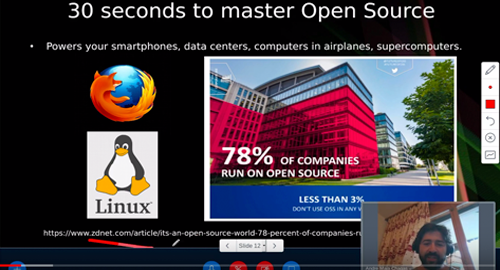Open Source software and tools for better research

The first webinar of the Open Science MOOC focused on Module 5: Open Research Software and Open Source and was pesented by our team colleague André Maia Chagas.
View the slides of this presentation at zenodo.org/record/3242340
Cite as: Maia Chagas, Andre. (2019, June). Bringing science to the 21st Century: Open Source tools for better research. Zenodo. http://doi.org/10.5281/zenodo.3242340
Online Course
Take the free Open Science MOOC online course: Module 5: Open Research Software and Open Source.
Resources and key takeaways
Why we need Open Source in Science
– REF: Ziemann, M., Eren Y., El-Osta A. (2016). Gene name errors are widespread in the scientific literature.Genome Biology201617:177. doi.org/10.1186/s13059-016-1044-7
Abstract: The spreadsheet software Microsoft Excel, when used with default settings, is known to convert gene names to dates and floating-point numbers. A programmatic scan of leading genomics journals reveals that approximately one-fifth of papers with supplementary Excel gene lists contain erroneous gene name conversions.
30 seconds to master Open Source
- Everything (code, hardware design, protocols, cake recipes) created is shared freely via licenses (GNU, Creative Commons, OSHWA, and many other), using any means at hand (Internet, usb sticks, recipe notebook)
- We’ve always done it. Now we just have a fancy name for it and metrics so that all projects follow a certain standard.
- Powers your smartphones, data centers, computers in airplanes, supercomputers
– REF: Vaughan-Nichols, S.J. (2015). It’s an open-source world: 78 percent of companies run open-source software. zdnet.com/article/…/
Open Science software
Project Jupyter exists to develop open-source software, open-standards, and services for interactive computing across dozens of programming languages. // The Jupyter Notebook is an open-source web application that allows you to create and share documents that contain live code, equations, visualizations and narrative text. Uses include: data cleaning and transformation, numerical simulation, statistical modeling, data visualization, machine learning, and much more.
Binder – Turn a Git repo into a collection of interactive notebooks
Search for Open Source Software in your discipline
– Many tutorials online
– Reach out to developers – they will be super happy to answer your questions
– Open Science MOOC Module 5 resources
– Openscapes – mentorship program to empower scientists with open data science tools
GOSH
Join the forum: https://forum.openhardware.science/


